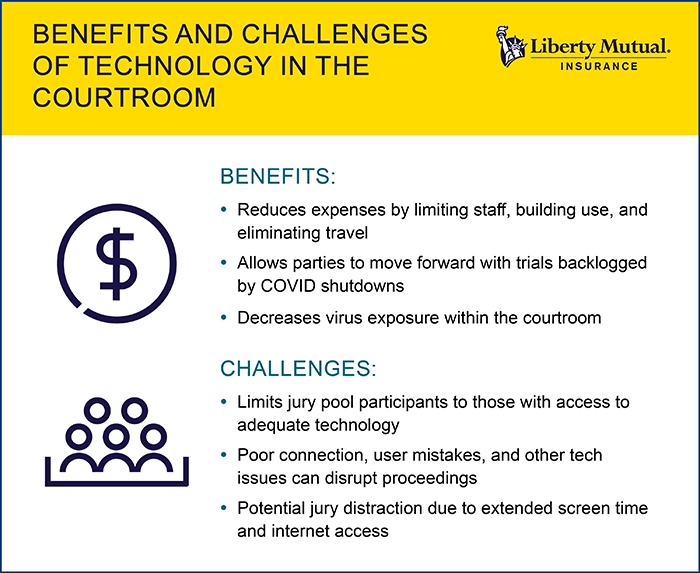Sponsored: Liberty Mutual Insurance
3 Alternative Methods Courtrooms Are Turning to Amid Pandemic-Induced Case Backlogs

The novel coronavirus has certainly impacted every facet of U.S. business since its onset in December 2019; we pivoted to a work from home environment and social distancing has become the public norm.
So, too, have the court systems been impacted by this growing need to contain the virus.
“Since shutdowns began almost a year ago, the courts have closed or significantly slowed down their operations,” explained Meg Sutton, SVP, Casualty, at Liberty Mutual. “As incidents of diagnoses reduced, you have seen some courts start to reopen or have soft openings for proceedings.”
However, many courtrooms have chosen to remain shuttered while they adhere to local and state mandates to stay closed.
“It’s leading to a buildup of litigation that could have been closed by this point in their lifecycles,” Sutton said.
It is this backlog of cases that has courtrooms looking for alternatives. How can they remain open while keeping public safety in mind?
To answer that, the courts have leveraged technology to their advantage. Here are just three ways the courts have begun to address case backlog and how each method brings advantages and concerns to the forefront.
1) Court room litigation proceedings are being held via Zoom rather than in-person.

Meg Sutton, SVP, Casualty, at Liberty Mutual
In order to combat the growing backlog in their dockets, some federal and state courts are scheduling an increasing number of proceedings via Zoom.
“The courts are leveraging technology during this time to keep the wheels of justice turning,” explained Kristin McMahon, SVP, Specialty Claims and Canada, Global Risk Solutions North America, at Liberty Mutual. The courts initially used Zoom for oral arguments with respect to motion practice, including motions for summary judgment, or appellate arguments. “Zoom has been an ideal platform for these types of hearings and was a modality adopted by some courts pre-COVID.”
However, we are now seeing courts embracing Zoom to conduct both bench and jury trials to prevent significant delays in getting litigants their day in court, according to McMahon.
Naturally, the biggest advantage courtrooms see from adding Zoom to the process is the elimination of in-person contact. This is great news for helping to keep virus spread to a minimum.
It’s also a time, cost and resource saver — schedules are easier to accommodate, travel is eliminated, and courts are working at reduced staff in-house with most workers dialing in remotely. And it keeps cases moving, bringing all parties from lawyers and witnesses to the juries and judges together at the click of a button.
However, there are still concerns. Especially when it comes to the Zoom trial itself.
“Juror distraction is a big one,” said Sutton. “Even under normal circumstances, where everyone is physically present, keeping jurors engaged can be difficult. With Zoom trials, there are fewer safeguards to ensure that jurors are not on their phones or multi-tasking in other ways. Jurors may also be tempted to research the case or the parties on the internet during the trial.
“Additionally, the jury pool changes when it’s remote,” Sutton continued. “It’s dependent on technology, which is not necessarily something every household has access to. You could really diminish your juror pool by eliminating people without access to advanced technology and people who aren’t as tech savvy.”
In the long-term, both McMahon and Sutton agreed that Zoom as a vehicle for fully remote trials is likely to lessen in popularity as places open back up.
“Though,” added McMahon, “from a pre-trial motions and depositions standpoint, using virtual appearances instead of in-person has shown effective for a number of reasons.”
2) Court ordered and private mediations have found a virtual home.

Kristin McMahon, SVP, Specialty Claims and Canada, Global Risk Solutions North America, at Liberty Mutual
When there is a court ordered mediation, judges have historically required in-person attendance by the parties to the litigation, their attorneys, and, if available insurance is in place to cover the liability of any of the defendant parties, an insurance company claims professional with the requisite financial authority to resolve the case if warranted.
Pre-COVID, courts routinely ordered in-person mediations to resolve cases to relieve the trial docket backlog — now with the pandemic, the number of cases on the trial docket has only increased.
“The backlog to the court system over the next few years is going to be very significant,” Sutton said. “Being able to schedule virtual mediation can help mitigate the backup.”
However, virtual mediation is only as good as the technology available, much like Zoom court.
“Also, a really effective lawyer might not be as effective virtually as they are in person,” Sutton added. “There could be elements lost through technology, especially eye contact or being able to read someone’s body language. That can be a disadvantage for both parties.”
There’s also the chance that invested parties are distracted by home environments, further leading to missed arguments or distraction.
“Some litigants have found that in addition to eliminating all travel costs, virtual mediations have been more effective and achieve higher rates of resolution than in-person mediations,” McMahon said.
For those matters where there is a will to resolve the dispute and the mediator is optimistic about finding a middle ground, extending the time window to continue negotiations is generally much easier virtually. But unlike in-person mediation where the parties often travel from out of state or cross country to make their appearance and catching the clock at day’s end to make their exit and catch the last flight out, virtual participants are able take a break and rejoin the virtual mediation later that day or evening from their own desktop, without fear of disrupting their work scheduled for the following day.
As McMahon and Sutton explained, although mediation has always been a preferable avenue to settle a dispute, the prospect of litigation during a pandemic has acted as a motivator to settle during mediation.
However, some mediation participants have had the opposite experience where the lack of urgency with a hard stop to adjourn has not been conducive to resolving the case. As the number of virtual mediations and arbitrations increases, we will garner more intelligence to compare both the benefits of and disadvantage of in-person and virtual mediations, McMahon commented.

3) Some courts are choosing to reopen regardless.
Though there has been a greater reliance on virtual court options, some states have already started to reopen courtrooms to resume activity. This has a few advantages, namely the courts are already designed to hold trials, whereas as a Zoom trial requires more set up.
But in-person court requires significantly more thought and logistics planning to be done correctly during the pandemic.
“There are a lot of machinations and lengths to which the court has to go in order to create a safe space for in-person litigation,” McMahon said.
There’s a need to keep jurors, plaintiffs, defendants and all other personnel six feet from their neighbor to adhere to social distancing recommendations. Additionally, jurors and witnesses are wearing masks, which could limit a court member’s ability to read someone’s body language or see facial expressions that could help or hinder a case.
“Also, restrictions are inconsistent across states,” said Sutton. “So, for example, a company in one state might be adhering to stricter rules and not allowing employees to travel. But then they might need to litigate a claim in another state that’s requiring an in-person trial. How do they balance that?”
A final concern is comfort levels of all the parties involved, particularly jurors. If a juror is uncomfortable being in a courtroom during the pandemic, then they may spend less time in deliberation and come to a quicker verdict in order to limit their own exposure. This could have adverse effects on cases that could benefit from discussion.
Keeping a Pulse on the Ever-Changing Court Landscape
While courts across the U.S. decide what method is best for them, cases and the people behind them are eagerly waiting for their day in court. In order to feel prepared and ready for whatever the trial or mediation may look like, Liberty Mutual is already waiting on the frontlines, keeping a pulse on the ever-changing court landscape.
“We’re monitoring the trends and adapting our approach as we enter into this ‘new normal’ during the pandemic,” Sutton said.
“We’re having conversations with customers on their open claim inventory and making sure the counsel that is defending or representing them has the training to effectively litigate virtually,” added McMahon.
Part of that preparation comes down to making sure any proceedings their partners enter are equipped with effective and high-quality technology. The Liberty Mutual team is also tracking and sharing the trends they are seeing with customers, from trial outcomes and the continuing trend of outsized verdicts to mediation protocols. Liberty Mutual’s Public Affairs office is also working to lobby in different jurisdictions for liability shield, business interruption and WC presumption coverages.
“We’re constantly looking at the way the courtrooms are changing and reporting on how our claims professionals have fared during virtual court,” Sutton said. “We’re looking at what’s working, what’s effective. And we’re using that to inform our decisions as we move forward so our customers have the right strategies in place.”
To learn more, visit: https://business.libertymutualgroup.com/business-insurance.
![]()
This article was produced by the R&I Brand Studio, a unit of the advertising department of Risk & Insurance, in collaboration with Liberty Mutual Insurance. The editorial staff of Risk & Insurance had no role in its preparation.










